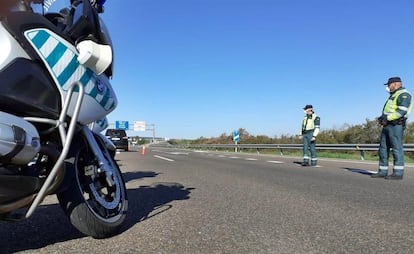Spain’s Civil Guard warns about risk of social unrest due to Covid-19 crisis
An internal document discusses the likelihood of street disturbances over the fallout of the prolonged lockdown


A confidential document by Spain’s Civil Guard warns about the “high probability” of growing social unrest over the coming months, which could result in isolated protests and street disturbances.
The document was drafted to reorganize security measures during the coronavirus deescalation process, which is expected to last until late June if there are no new spikes in transmission.
Spain has been under a state of alarm since mid-March, when the government began using emergency powers to keep citizens in confinement in a bid to curb the spread of the coronavirus, which has hit this country particularly hard.
But there has been growing opposition to continued two-week extensions to the state of alarm, which Prime Minister Pedro Sánchez of the Socialist Party (PSOE) now wants to extend to June 29.
The Civil Guard report is one of several documents that law enforcement agencies have drafted at the request of the Interior Ministry, in order to come up with a unified action plan for the coming months.
Politically motivated acts
The Civil Guard’s internal document warns about the risk of “acts of sabotage against critical infrastructure or buildings with ties to political parties.”
It also talks about “politically-motivated or separatist acts aimed at disturbing the peace.”
EL PAÍS has seen the 22-page document, which was originally reported on by the daily El Periódico, and which lists the potential scenarios that the law enforcement agency is preparing for.
Dated this month and signed by the Civil Guard’s top operations commander, Lieutenant General Fernando Santafé, the document lists the potential instigators of future disturbances as “people who have been affected by an ERTE [a temporary layoff scheme] or fired” and “production or services sectors that might consider themselves harmed by the ongoing restrictions and limitations.”
The document warns about the risk of “acts of sabotage against critical infrastructure or buildings with ties to political parties”
The report further cautions that these incidents could take place “in geographical areas that view themselves as being marginalized due to the asymmetrical application of deescalation measures,” as well as “in economically depressed areas.” The authors of the report note that the current economic crisis “will impact the most disadvantaged citizens, who could see their basic needs unmet.”
The document says there could also be protests and street disturbances as a result of “violations of rules of conduct and self-protection measures,” or if local fiestas are banned, or if “the executive does not allow mobility on weekends or during vacation time.”
In this crisis scenario, the Civil Guard has also warned about the possibility of rising crime rates, which have plummeted during the lockdown. As confinement measures are gradually eased, the increased mobility can help criminals go about undetected. This could lead to more burglaries, especially in second homes, as well as in “commercial establishments and livestock and farming facilities.” The law enforcement agency also talks about a rise in crimes against vulnerable groups such as children and the elderly. As for terrorism, “no specific threat is known about for now,” although Jihadist terrorists’ ability to act in Europe remains high. On May 8, a jihadist suspect was arrested in Barcelona for ignoring shelter-in-place rules and going out to seek potential attack targets.
Cyber-surveillance
Civil Guard experts recommend maintaining their “observation of activity on social media and other online forums” to detect potential calls to organize episodes of unrest or defending the violation of rules.
This kind of cyber-surveillance triggered a political storm in April after Civil Guard General José Manuel Santiago said at a news conference that his agency was searching the internet for hoaxes, “to prevent the social stress created by these hoaxes, and to minimize the [online] environment that opposes the government’s handling of the crisis.”
The report notes that the Spanish population has accepted the lockdown, which started out as one of the strictest in Europe. “It is likely that this will remain the general rule throughout the entire process towards the new normality,” reads the document. But the deescalation could take “several months,” and there could be steps back if there are new spikes in the disease during the winter.
English version by Susana Urra.
Tu suscripción se está usando en otro dispositivo
¿Quieres añadir otro usuario a tu suscripción?
Si continúas leyendo en este dispositivo, no se podrá leer en el otro.
FlechaTu suscripción se está usando en otro dispositivo y solo puedes acceder a EL PAÍS desde un dispositivo a la vez.
Si quieres compartir tu cuenta, cambia tu suscripción a la modalidad Premium, así podrás añadir otro usuario. Cada uno accederá con su propia cuenta de email, lo que os permitirá personalizar vuestra experiencia en EL PAÍS.
¿Tienes una suscripción de empresa? Accede aquí para contratar más cuentas.
En el caso de no saber quién está usando tu cuenta, te recomendamos cambiar tu contraseña aquí.
Si decides continuar compartiendo tu cuenta, este mensaje se mostrará en tu dispositivo y en el de la otra persona que está usando tu cuenta de forma indefinida, afectando a tu experiencia de lectura. Puedes consultar aquí los términos y condiciones de la suscripción digital.








































